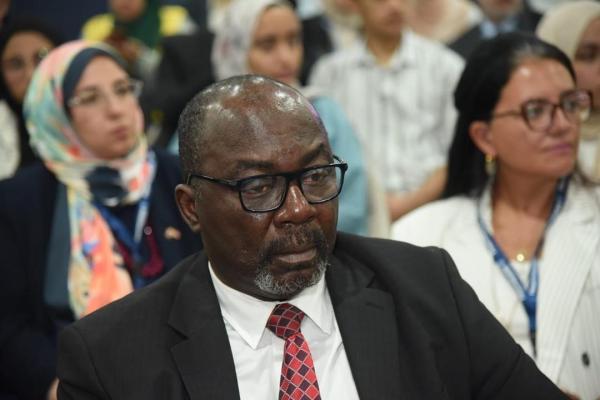
Late Mayowa
One death too many, and the University of Ibadan students disrupted academic activities to protest the death of Alaran Muslihudeen Mayowa, a 200-level student of human education.
One of the protesters, who chose to be anonymous for fear of victimisation, said, “The responsibility of any academic institution is to cater for the wellbeing of students and staff within and outside the academic community. But University of Ibadan, rated as ‘the first and the best’ and a pace-setter institution, has fallen short of expectation. The university now lives in the shadow of its past. Hence, it must wake up from its slumber and live up to the expected standard. To whom much is given, much is expected.”
A student, who also asked to be identified simply as Remi, told CEOAFRICA that the pace-setter university is grossly suffering from poor administration. She pointed out some of such anomalies as poor power supply, inadequate water supply in some halls of resident, poor internet facility, poor health service delivery, and that many lecturers are not committed to their duties. Rather, they are busy pursuing other interests at the expense of their primary assignment and hardly come to lecture.
Remi said that the faulty management operations had caused a lot of havoc in the university environment, ranging from sicknesses, attacks, deaths, et cetera. She, however, refused to comment on the death of Mayowa.
CEOAFRICA gathered that sometimes ago a student was injected in a wrong part of her buttocks. Temporarily paralysed, she had to use crutches for about two months. Her parents had to take her away to another hospital for medical treatment. Yet another instance was the case of a student in Kenneth Mellanby Hall who collapsed during a football match. He was left unattended to because he was not with his Jaja card. Eventually he died. There are series of such cases even in recent times.
The death of Mayowa and the protest have caused the university to look inward and the authorities have come up with a programme that will hasten healthcare service delivery to the studentry.
Three functioning emergency telephone lines have been made available at the university community. Also, as part of the improvement strategies, specialist clinics are now available for asthma (Mondays); orthopaedics (Tuesdays); mental health, diabetes and immunisation (Wednesdays), and general surgery (Tuesdays and Fridays).
Trouble seized the university community when Mayowa died, but not all agree till date on the cause of death. “He slumped, all right, but whether he passed on before the emergency call was made, or died because he was left unattended to at JAJA clinic, or that he was asthmatic remains cloaked in secrecy,” said a concerned student.
An eyewitness account said it was like a normal Wednesday in Independence Hall. The junior common room was filled to the brim with students who wanted to watch the Champions’ League. The hall had a single television, powered by a generator set. Mid-way into the match, Mayowa suddenly slumped probably because the hall was poorly ventilated.
According to the witness, some medical students, who were present, gave him a first-aid treatment by administering pulmonary as well as mouth-to-mouth resuscitation and inhaler. “While this was ongoing, a call was put to the emergency unit of the University Health Centre for an ambulance. There was no prompt response.
“Luckily, a fellow hall resident provided his car and Mayowa was taken to the clinic. He was given a bed in the clinic. His friends were asked to provide his identification card, simply referred to as JAJA card. They could not provide this, since Mayowa was unconscious. This question was asked to get the medical history of this student to know what led to the present situation. Eventually, the file was sorted out; there was no history of asthma or any chronic ailment.”
The witness went on: A final attempt to resuscitate him at the university clinic was met by empty oxygen tank. At the end, Mayowa gave up the ghost.
This incident led to the peaceful demonstration by the students which paralysed academic activities of the school on 7 May 2015. All the roads leading to the school were blocked by the aggrieved students who attributed the death of their colleague to the nonchalant and lackadaisical attitude of the medical personnel at the health centre and the absence of a functioning pharmaceutical unit in the university.
However, another student who identified himself as Femi, a linguistics student resident in Tedder Hall, told CEOAFRICA that he had a similar issue last month when he fainted.
“I was rushed to the university clinic and was promptly attended to. Mayowa’s death might be how God wanted it. That was his fate,” he said.
A nurse, who did not want her name published because she was not authorised to speak to the press, told our reporter that Mayowa had passed on before he was brought to the clinic; he was certified dead.
Though she hinted that the policy of the university “is that only duly registered students can access medical care and it must be verified before treatment is administered to any student,” she would not comment on why the ambulance did not arrive on time.
A non-academic staff, who gave his name as Mr Ademola, told CEOAFRICA that Mayowa had died before he was rushed to the hospital. He said that the students only exaggerated the incident and took to protesting.
When our reporter visited the directorate office of public communication, Office of the Vice Chancellor, a reliable source said that the VC, after series of meetings with students and relevant stakeholders, set up a committee on the incident. “The Term of Reference is to look at the remote and immediate cause of the death and proffer recommendations on improvement of service delivery at University Health Service.”
The Union of Campus Journalists, in a press release dated 23 May 2015, said the university management had insisted, after carrying out its investigation, that the late student died before he was taken to the clinic, but it failed to address the question: “Why did one of the drivers of the ambulances not go to the hall where the incident happened?”
However, the studentry has demanded that at least three functioning ambulances be provided for all the various halls of residence at night, in the case of emergency. And all students of the institution should be trained about first aid.
Whether the authorities will accede to these demands is not yet known.






















